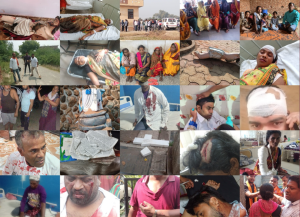 The Religious Liberty Commission of the Evangelical Fellowship of India has published its yearly report for 2023, Hate and targeted violence against Christians in India, which records 601 anti-Christian incidents throughout the year.
The Religious Liberty Commission of the Evangelical Fellowship of India has published its yearly report for 2023, Hate and targeted violence against Christians in India, which records 601 anti-Christian incidents throughout the year.
The report begins by stating that 2023 saw “an unfortunate increase in divisive rhetoric and inflammatory language” and goes on to lament that, “The same was not adequately addressed by official channels and sometimes it seemed to have been condoned… The resulting sense of immunity in sections of society has led to a painfully large number of incidents of violence against the Christian Community, and religious minorities in general.”
The data show a sharp increase in the number of violent incidents against the Christian community, climbing from 413 in 2022, and the RLC/EFI criticises India’s political apparatus, law enforcement agencies and justice system, especially at village- and small town-level, for slow and inadequate responses “despite urgent pleas for help from victims, church leaders and civil society”.
India’s largest state, Uttar Pradesh, recorded the most cases at 275, with Chhattisgarh next at 132 cases, followed by Haryana with 44 cases. Uttar Pradesh also recorded the highest number of detentions of Christians on allegations of forced conversion by local political groups. Many of those arrested were simply participating in birthday gatherings or prayer meetings and some remained in custody for extended periods without bail. The report points out that the process for their release can be protracted, with legal proceedings potentially dragging on for years.
The total number of Christians arrested in India was a record 648, of which 440 cases were in Uttar Pradesh. Some 35 Christians were still awaiting release at the end of the year.
The most common types of incident recorded were arrests (233 cases), threats and harassment (201 cases), physical violence (54 cases), church worship stopped (40 cases) and social opposition or boycott (37). In addition, two church buildings were burnt and seven buildings were vandalised.
The report emphasises that these numbers are “just the tip of the iceberg” and explains, “In a vast country such as India and with its social dynamics, often people are too frightened to even file a complaint. All too often, the police are lax in recording or investigating instances of hate crimes of a religious nature.”
It should be noted that each incident usually affects many Christians, so the number of affected individuals is very much higher.
Why are Christians targeted?
Addressing the reasons behind the targeting of Christians, the report states, “For Christians, the main whip hand is the false bogey of proselytisation which is used to justify horrific crimes against the community”. It also explains that Christian women and Christians from a Dalit or Adivasi (aboriginal tribal people) background are extra vulnerable to violence and discrimination due to their intersectional identities.
“Christian tribals face a double whammy of their ethnic status as Tribes obliterated on conversion to Christianity,” the report explains, “but not on conversion to Hinduism from their ancestral modes of faith and nature worship”.
It adds that the far-right Hindutva movement, which has extensive support in many states, wrongly accuses Christians of engaging in forced conversions, an unfounded claim that is used to justify targeted aggression.
Case studies
 The report includes several case studies, in addition to the state-by-state list of incidents that follows the main text. The first describes an attack on a prayer gathering in Palghar, Maharashtra state on 6 August 2023, when three masked men brutally attacked Pastor Xavier Palhar (54), his son and another attendee with iron bars. The extremists falsely accused the Christians of participating in religious conversion activities and vandalised the church premises. Pastor Palhar was severely injured and had to be admitted to hospital, with months of bed rest to follow. He lodged a police complaint against the attackers.
The report includes several case studies, in addition to the state-by-state list of incidents that follows the main text. The first describes an attack on a prayer gathering in Palghar, Maharashtra state on 6 August 2023, when three masked men brutally attacked Pastor Xavier Palhar (54), his son and another attendee with iron bars. The extremists falsely accused the Christians of participating in religious conversion activities and vandalised the church premises. Pastor Palhar was severely injured and had to be admitted to hospital, with months of bed rest to follow. He lodged a police complaint against the attackers.
Another case study describes an incident that took place on 19 March 2023 in Jodhpur, Rajasthan state, when a church led by Pastor Raju Thomas was holding its annual ten-day prayer meeting at the Church of North India community hall. A group forced its way into the hall and filmed the prayer meeting, then locked the two exit gates from the outside, preventing approximately 250 Christians from leaving. The extremists interrogated the Christians and accused them of offering people money to convert. They tore Bibles, used abusive language and attempted to ransack the place. Ten Christians reported that they were beaten up.
Conclusion
The compilers of the report conclude that while constitutional provisions aim to safeguard the rights of all religious and ethnic groups, “the emergence of majoritarian politics and the advocacy of Hindu nationalism by certain factions have fostered an atmosphere of intolerance and exclusion, undermining the secular principles enshrined in the Indian constitution” and go on to advise that the escalating violence against Christians “demands immediate attention and action from both national and international stakeholders. Upholding constitutional rights and combating intolerance are essential steps towards fostering a more inclusive and harmonious society.”
The EFI urges the Indian government and relevant state administrations to uphold the rule of law and ensure the safety of religious minorities, and notes that “specifically, action is needed in Uttar Pradesh, Chhattisgarh, Haryana, Karnataka, and Madhya Pradesh to address organisations promoting communal violence and hatred.”
Before the detailed state-by-state list of incidents that comprises the vast bulk of its text, the report makes 14 recommendations to the Government of India. They include:
•Ensure that a comprehensive national legislation is enacted against targeted and communal violence.
•Advise the State Governments of Uttar Pradesh, Himachal Pradesh, Uttarakhand, Jharkhand, Gujarat, Madhya Pradesh, Chhattisgarh, Odisha, Karnataka and Haryana to repeal the unconstitutional “Freedom of Religion” laws [anti-conversion laws] that actually limit religious freedom and are being misused by agenda-driven groups to harass and create trouble for religious minorities.
•Enforce the rule of law by acting against members of groups that promote sectarian hate and violence and are involved in falsely accusing people, particularly Christians, of being involved in conversions.
•Ensure strict action against vigilante mobs who round up individuals, trespass and damage private property belonging to churches, Christians or persons of other religions, raise communal slogans outside police station premises or other places, on the pretext of forcible religious conversions.
•Advise state governments, especially Uttar Pradesh, Chhattisgarh, Jharkhand and Madhya Pradesh, to deal with right-wing organisations and other extremist elements.
•Prosecute police officials who fail in their constitutionally mandated duty to enforce the law of the land, by being complicit in attacks against religious minorities and by shielding the attackers. Install CCTV cameras in local police stations across India.
•Prevent and pursue through the judicial process all violent acts against religious and tribal minorities and Dalits.
•Ensure compensation for individuals and institutions belonging to religious minorities who are targeted for their religious identity.
(Evangelical Fellowship of India Religious Liberty Commission)
Photomontage: Evangelical Fellowship of India Religious Liberty Commission
